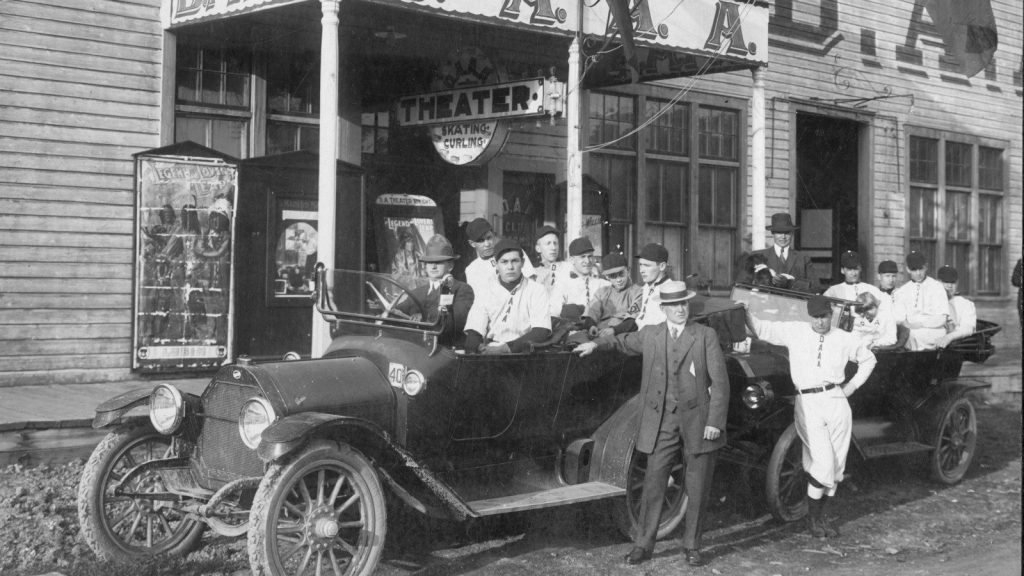
DAWSON CITY: FROZEN TIME
Director: Bill Morrison
Screenwriter: Bill Morrison
Cast: Kathy Jones-Gates, Michael Gates, Sam Kula, Bill O’Farrell, Bill Morrison
Screened at: Critics’ link, NYC, 5/30/17
Opens: June 9, 2017 at New York’s IFC Center
If you’re a film buff, you might be one of the relatively few people who saw “Decasia,” Bill Morrison’s meditation on humankind’s attempt to transcend physicality. Eschewing a narrative connection, “Decasia” is a short, 70-minute movie of film reels now self-destructing, including some rare old shots of a whirling dervish, scenes of the sea, camels, factory workers, Ferris wheels and the like. Now Morrison expands his view to issue a two-hour meditation on silent films based on a find that film buffs might equate with the discovery of Dead Sea scrolls, in at least as poor condition as some of the silent films on display. The films shown in Morrison’s “Dawson City: Frozen Time” are contemporary when compared with the Scrolls, as even the most ancient is just 120 years old. No professional archaeologist or film curator may have been on hand when a bulldozer in 1978 uncovered 533 nitrate film prints that date from 1897 through World War One.
“Dawson City” is all about the location of these lost films (75% of silent films are gone forever), with a great deal of shots of the Yukon Territory’s Dawson, which was settled in 1896 and is the locus of the Canadian Gold Rush. Philosophers may find it sad that gold, a fairly useless metal, had such value that it drew prospectors by the hundreds to the area north by northwest of the Yukon’s capital, Whitehorse, but human beings follow the money, as they’re saying now on CNN.
Bookmarked by commentary, the major segment of the film draws upon the gold rush, featuring a bevy of still photographs and newsreel clips of the men who, with broad hats and bold mustaches left home to try their luck. If you can somehow shut down Alex Somers’s intrusive music, which is not at all needed, you might find quite a few of these moving picture clips entertaining, perhaps even satisfied to find so many of them plagued with the sorts of defects that you’ll find in movie theaters when the projectors break down and the screen projects black holes, spots, and burned celluloid.
Because the films shown in Dawson City could be returned to the U.S. only by paying a large tariff, most were burned, easy to do since the nitrate stock is flammable; or dumped into the Yukon River by error or by inclination. Despite their age, these pics are 35mm, some well preserved since they are sealed in the territory’s permafrost, while others are barely in shape even for the most dedicated fans of silent pictures.
Much of this overlong film is of the gold rush, becoming tedious despite the importance of its discovery, while the more involving ones deal with events surrounding World War One. Particularly engrossing is the action taken against radicals, mostly union organizers for such organizations as the radical International Workers of the World, the most famous of the subversives being Emma Goldman who was deported to Russia along with some 270 acolytes.
A major flaw in Bill Morrison’s doc is the rapidity with which the films zoom past us, sometimes so quickly that we can barely see their titles. Silents had their day from 1897 through 1929, and there’s virtually no market outside a special group of fans who tout Charlie Chaplin’s and Buster Keaton’s performances to try to get more folks involved in their cult. You might see the relevance today of Mr. Chaplin’s role in “The Great Dictator” and while there may be no prospectors for the yellow metal in the U.S. or Canada nowadays, there are many other ways that ambitious folks can strike gold.
Unrated. 120 minutes. © Harvey Karten, Member, New York Film Critics Online
Comments, readers? Agree? Disagree? Why?
Story – B
Acting – B-
Technical – B+
Overall – B





